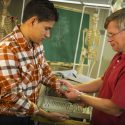Initiative positions Wisconsin to become leader in personalized medicine
Wisconsin may soon become an international leader in personalized medicine, a simple concept that has the potential to revolutionize healthcare. With this approach, physicians will analyze an individual’s genome, or entire genetic make-up, in order to identify what diseases he or she might be susceptible to, then suggest strategies to prevent the problems or treat them most effectively.
On Friday, Oct 10, 2008, Gov. Jim Doyle announced the project that may very well propel the Badger State to the head of the new field: the Wisconsin Genomics Initiative. The public-private initiative brings together, for the first time, the UW School of Medicine and Public Health (SMPH), Marshfield Clinic, the Medical College of Wisconsin and UW-Milwaukee.
“By aligning the intellectual capital of four major institutions that focus on healthcare education and delivery, the state of Wisconsin stands to make major gains in science and healthcare,” said the governor. “Here in Wisconsin we are in a unique position to lead the way.”
The project will also foster the development of new and existing industries needed to support individualized healthcare, added Doyle.
Personalized medicine may be a simple concept, but achieving it is anything but, says Paul DeLuca, vice dean and associate dean for research and graduate programs at the SMPH.
“It will take the special capabilities of each partner in the initiative to accomplish our goal, and it could never be done alone,” De Luca says. “Each of the four partners is a leader in one or more areas needed for this to be successful.”
Marshfield Clinic has created the nation’s largest bio-bank, consisting of DNA samples from 20,000 individuals. The samples, often from extended families, have been linked electronically to medical records for more than 20 years of medical history.
The Medical College of Wisconsin is one of the top human genetic research centers in the country. It will perform DNA sequencing to identify genes, mutations and other genetic markers hidden in each DNA sample from Marshfield. UW-Milwaukee will contribute through its on-going research in urban health care and health informatics.
“This will produce a monstrous amount of data that we will analyze here at the SMPH,” says De Luca.
In its Department of Biostatistics and Medical Informatics, the SMPH has of one of the strongest statistical genetics groups in the country as well as top computational scientists. This dual strength gives the scientists formidable computing power.
“By correlating the genomic data and information from the medical records, our computer scientists will identify patterns that relate to the incidence of complex diseases,” De Luca says. “The analysis might tell us, for example, that a certain collection of bio-markers make a person susceptible to cardiovascular disease.”
Using genomic information in clinical decision-making has been a major goal of the Human Genome Project, a world-wide program to map the entire human genome.
Work on the Wisconsin Genomics Initiative will be conducted in two phases. During Phase I, researchers will build a scientific model that will predict susceptibility to certain diseases and response to treatments. In Phase Two, the model will be applied to a wider variety of people and different diseases.



